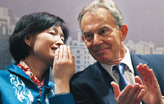Editorials
Beijing's parking problem
Updated: 2011-04-02 07:51
(China Daily)
The problem of parking Beijing's nearly 5 million cars is no less upsetting than traffic jams.
The Beijing government increased parking fee and launched a 100-day action plan from April 1 to regulate parking of cars. These are welcome moves because cars parked randomly on pavements and in bicycle lanes and even some motor lanes have been disrupting the movement of motor vehicles, cyclists and pedestrians alike.
Yet it is doubtful whether the 100-day action plan will help solve the parking problem once and for all, because the primary contradiction between lack of parking space and rapid increase in the number of vehicles can hardly be resolved in such a short time.
This gap is the price urban planners have to pay for their lack of vision - most of the buildings built in the 1990s have no provisions for underground parking lots and even today very few housing units have well-designed and efficient parking facilities.
Another problem is that even if there were enough parking lots, many drivers would still prefer parking their cars in places where parking fee is not charged. Such blatant violation of traffic rules has contributed considerably to the parking chaos in the city.
Beijing has promised to increase parking space by building vertical car parks and turning the old underground air shelters into parking areas. This is a good move to prevent drivers from parking their cars randomly on the pretext of not being able to find a proper car park.
This means traffic wardens will be employed again and will be given the authority to stick notices on cars parked in wrong places to inform offending drivers of their wrongdoing. To ensure that the drivers are punished duly, traffic wardens will be required to keep detailed records, including photographs or videos of the cars, and send them to the traffic police department. This will give law enforcers enough evidence to impose fines on the offending drivers.
Though such measures may have a deterring effect on drivers, a lot still needs to be done to regulate traffic wardens' work. To begin with, they used to have the power to stick notices on cars parked in wrong places but were barred from doing so after some drivers lodged complaints against them.
Hence, proficient, honest and well-disciplined traffic wardens are a key to solving the illegal parking problem.
China Daily
E-paper

Green mission
Tony blair believes China will take a leading role to fight climate change and cut emissions.
The spring of new professions
Real modern times
F1 sponsors expect returns from Shanghai stop
Specials

Share your China stories!
Foreign readers are invited to share your China stories.

Have you any wool?
The new stars of Chinese animation are edging out old childhood icons like Mickey Mouse and Hello Kitty.

Fill dad's shoes
Daughter and son are beginning to take over the family business of making shoes.




